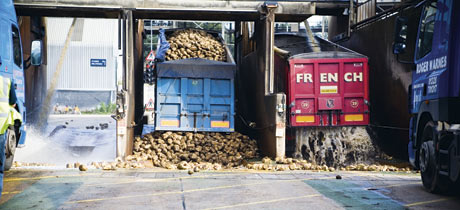Farmers speak out about sugar beet deal

The sugar beet price has been fixed at £26/t for 2010, with an extra £1/t if British Sugar and the NFU agree a longer-term contract. So is it a good deal? And what should a long-term deal look like? Mike Abram explores
William Martin, NFU sugar board chairman
 William Martin, says the 2010 sugar beet deal represents a fair outcome for both growers and British Sugar.
William Martin, says the 2010 sugar beet deal represents a fair outcome for both growers and British Sugar.
“I will definitely be growing again next year.”
He is reluctant to dwell on the tactics the NFU used this year, particularly the £34.50/t starting price for negotiations, preferring to highlight the deal as the starting point in a new relationship between the NFU and British Sugar.
“The £34.50/t represents the old way of negotiating,” he admits. “Having this annual stand off, particularly in the past couple of years, wasn’t delivering any benefit to either side.”
This admission is why both the growers and the processor are committed to forging a new relationship, one that will run until 2014 when the current EU sugar regime ends.
And there is an important carrot: Agreeing this will add an extra £1/t to the transport allowance British Sugar will pay for the 2010 crop.
But the new deal will need to addressall the long-standing grievances within the current contract, including campaign length, crowning, transport, temporary volumes and coming up with a pricing mechanism to prevent the annual stand-off.
“Let’s be honest, neither growers nor British Sugar are going to get exactly what they want; there will have to be concessions on both sides. But the final agreement needs to be fair.”
Agreeing a pricing mechanism looks like being particularly tricky, with several different options available, like a fixed price or a minimum one linked to wheat values or production costs.

“All of them are in the mix,” Mr Martin says. “Most growers appear to have an appetite for a fixed price of some sort before they plant the crop, so they know what they are getting.
“But there are pros and cons for linking it to the wheat price, for example. British Sugar knows the crop is competing for a slot in the rotation, and if it is way out of line with other crops, then farmers might not grow it. On the other hand something that slavishly follows the wheat margin is not necessarily ideal either.”
The negotiations are scheduled to run into the New Year, with the target of having a long-term deal in place by the end of March.
An independent, third-party moderator will be appointed to help keep the process on track, Mr Martin says. “Richard McDonald and Mark Carr have to agree the appointment, but it will be someone with a reasonable stature in the industry to help us meet the ambitious time scale that has been set.”
Oliver Walston, Thriplow, Cambridgeshire
 At a tense meeting with British Sugar and farmers at Peterborough in September, Mr Walston was one of the growers who said he wouldn’t grow beet in 2010 if the price was cut.
At a tense meeting with British Sugar and farmers at Peterborough in September, Mr Walston was one of the growers who said he wouldn’t grow beet in 2010 if the price was cut.
But the £26/t offer, plus the prospect of an extra £1/t, is enough to persuade him. “In my language, it is the same price as last year.”
He believes the £1/t was added by British Sugar as a face-saving measure. “At the Peterborough meeting, BS was saying it would pay £26/t, which was a quid less than last year. Now, it is paying £27/t. I say: Good – that’s what I was asking for. Yes, it is £1/t on transport, but I don’t care where it comes from. It’s still £27/t.
“I consider we’ve won. If there’s no agreement in six months’ time, then obviously I may have to change my mind. But I will be amazed if they don’t agree on a system.”
That deal should be based on two things, he says. “One, the growers’ costs, which British Sugar is more than happy to do, and two, the processor’s costs, which it is not.
“If my costs go down it seems reasonable that British Sugar pays less. But, equally, if British Sugar’s profits go shooting upwards because of increased efficiency and high world sugar prices then it is quite reasonable for growers to expect more. British Sugar needs to open its books, and show us its costs, so we can have a genuine partnership.”
Paul Drinkwater, Abbots Ripton Farming Co, Huntingdon, Cambridgeshire
“It looks like I’m still a beet grower,” says Paul Drinkwater, who looks after 22,000t of quota. “But I am relying on William Martin to sort out a long-term deal so the price is the same as last year.
“The NFU’s recommendation is to fill out the form and send it back. I would have liked the same price as last year without the clause. In fact I would have liked an extra £2/t, but it wasn’t that likely. But effectively we’ve got the same price, as long as there is an agreement, and I’m not that worried that there won’t be one.”
He isn’t sure what else the NFU could have done to gain a better price. “It is not easy to deal with a monopoly. Perhaps the £34.50/t was a bit on the high side, and probably both sides knew from the start it was unrealistic, but it created some lively debate.
“The problem is we’re not fighting from a position of strength. When Karl Carter stands up and says: “If you won’t grow, someone else will”, he’s probably right. Farmers have short memories, and won’t remember 18 months ago [when beet profits were marginal], so there are probably those willing to take up quota.
“These crisis meetings are no good to man nor beast. I want a deal to hang my hat on that is three years at least, preferably five.”
But he doesn’t want it on a cost-plus basis. “I hate cost plus. They tried it on the potato job and couldn’t make it stick. Whose costs are they going to take? Karl Carter tells me he knows what [our] costs are, but he doesn’t know all of them. For example, last year with the heavy machinery we completely destroyed a road that cost £5000 to put back. For me that cost goes against the sugar beet crop. Likewise the reduced wheat yield after beet – is that factored in?
“I’d rather a base price of where it is now – I’d be reluctant to grow it for less – and link it to the wheat price.”
Tom Dye, Saxlingham, Norfolk
Norfolk grower Tom Dye will also be growing beet again, although it puts more pressure on to grow it well, he says.
“It is obviously disappointing the negotiations have achieved nothing more than what British Sugar wanted them to do.
“But British Sugar operates from a position of strength. When Karl Carter says he has 350,000t worth of requests for extra tonnage over the 800,000t of temporary tonnage you can see the problem.
He is worried about the long-term deal. “My concern is that it won’t be on the best terms for the grower.”
He hopes future pricing is linked not just to wheat prices but also other crops, such as vegetables and potatoes. That mechanism also has to take into that account some beet crops will be in the ground beyond November – the time mooted for linking the wheat futures prices to beet.
“It needs to be linked to a futures price later than that. I guess some linkage to costs should also be part of the package, and a minimum price.”
Steve Bumstead, Great Barford, Bedfordshire
 At 52 miles from his nearest factory, you might think Bedfordshire grower Steve Bumstead would be thinking seriously about the future. But he’s still keen to grow the crop.
At 52 miles from his nearest factory, you might think Bedfordshire grower Steve Bumstead would be thinking seriously about the future. But he’s still keen to grow the crop.
“I’ve got to be happy with £26/t, but I don’t really like the uncertainty surrounding agreeing a framework. It means the NFU has to be very careful how they negotiate, because it could disappear, but it also has to stand its ground and represent our interests.”
He would like to see a four-year deal, possibly index-linked to inflation. “My personal figure is £30/t. Surely we should be setting beet as the gold standard to benchmark other commodities against. The problem is this isn’t being treated as a partnership; we should all be making money.”

